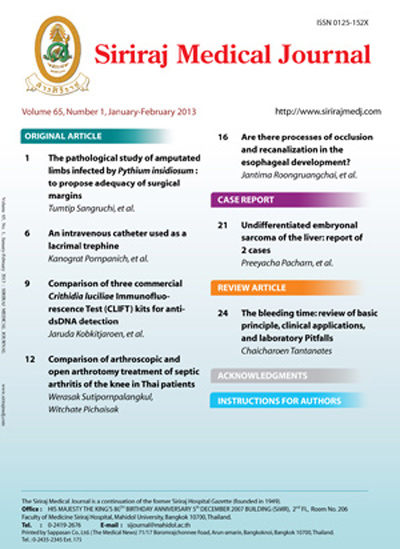The Effects of Ayurved Siriraj Wattana Recipe on Splenocytes in Wistar Rat
Keywords:
Wattana Ayurved Siriraj, splenocyte, immunostimulationAbstract
Wattana Ayurved Siriraj herbal formulary® has been used for decades and is quoted to carry anti-ageing action. Here, we have investigated the immunological efficacy and the safety for the consumption of Ayurved Siriraj Watana Recipe in Wistar rats. Rats were orally administered with Ayurved Siriraj Watana Recipe at a dose range of 0, 100, 300 and 1,000 mg/kg Body Weight (BW) for 14 days. After the treatments, splenocytes were isolated from these rats and examined for cell proliferation and NK cell activities. We found that the ingestion of Ayurved Siriraj Watana Recipe was not toxic to Wistar rats in all doses based on general gross and microscopic examinations. The recipe could not drive the proliferation of rat splenocytes in a dose-dependent manner. The ingested Ayurved Siriraj Watana Recipe also could not drive the NK cell cytotoxicity. Both the proliferative and NK cell assay revealed unfavorable response from rats ingesting 300 mg/kg BW AVS073. In summary, the ingestion of Ayurved Siriraj Watana Recipe in Wistar rats was safe with the studied dose. The use of Wistar rats for immunological screening of Ayurved Siriraj Watana Recipe or others is not suitable, since conventional mitogens also failed to stimulate their splenocytes. Other established animal models (e.g., BALB/c mice) would be more relevant.Downloads
Published
How to Cite
Issue
Section
License
Authors who publish with this journal agree to the following conditions:
Copyright Transfer
In submitting a manuscript, the authors acknowledge that the work will become the copyrighted property of Siriraj Medical Journal upon publication.
License
Articles are licensed under a Creative Commons Attribution-NonCommercial-NoDerivatives 4.0 International License (CC BY-NC-ND 4.0). This license allows for the sharing of the work for non-commercial purposes with proper attribution to the authors and the journal. However, it does not permit modifications or the creation of derivative works.
Sharing and Access
Authors are encouraged to share their article on their personal or institutional websites and through other non-commercial platforms. Doing so can increase readership and citations.











